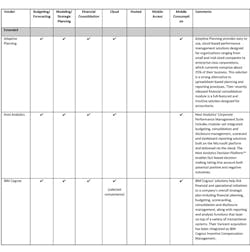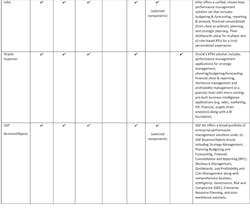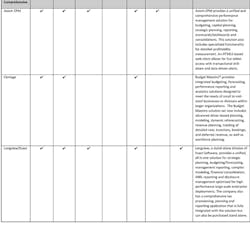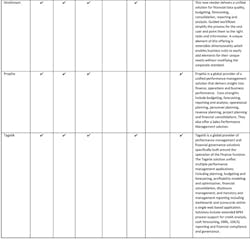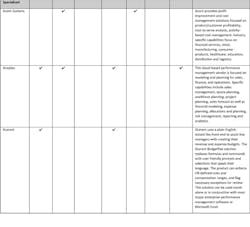2014 Performance Management Buyer's Guide: A Multitude of Riches
The performance management market today offers the broadest array of choices since this category came into existence. There is something for everyone: budgeting solutions that leverage spreadsheets and ones that don’t, financial consolidation from the most basic to the most advanced, cloud-based or on-premise solutions, high-end fully loaded solutions to straightforward ones for companies with more modest needs and budgets. There is a solution for almost every need and budget.
With a slow-down in the pace of acquisition resulting in less consolidation, combined with the addition of several new vendors in recent years, this year’s crop of vendors is the broadest and strongest we have seen. In addition to this bigger range of choices, the solutions themselves are better—more features, more areas addressed, and the time to payback is faster. Today’s application solutions offer more out-of-the-box functionality, which reduces implementation time, along with the related consulting costs.
Established Vendors
The vendors who have already achieved success in this space are not sitting still. Almost every vendor has a major release every 12-18 months, while several vendors such as Adaptive Insights (formerly known as Adaptive Planning) and Host Analytics offer smaller updates each quarter. These releases generally expand the core functionality of the product.
Most vendors already offered budgeting, so functional growth has been in areas such as financial consolidation, strategic planning and modelling, operational analytics, and advanced reporting capabilities. Centage, for example, has broadened its offering to the point that it is one of the most comprehensive solutions targeted at the SME market.
From a technical perspective the vendors have been grappling with how to cloud-enable their existing product set while also trying to address the nascent demand for mobile access. SAP, IBM and Oracle have been rolling out cloud-enabled versions of various components of their solutions. Longview has been very successful with the SaaS version of its tax solution. Tagetik and Axiom EPM have formalized their hosted options, while Prophix in its latest release introduced strong mobile capabilities. All of these vendors must be doing something right, because the levels of customer satisfaction (as measured by the BPM Pulse survey we conduct every year), are the highest ever recorded.
New Entrants
While the existing vendors were busy broadening and deepening their offerings, a group of new vendors arrived on the scene to further expand the available choices. We believe that to make it in the established performance management space these new vendors need two things: a senior management team with performance management experience, and a uniquely compelling offering. The vendors we are including in this year’s guide meet both of these criteria.
Tidemark, comprised of ex-OutlookSoft and SAP executives, has created a cloud-based, fully mobile solution that is strong on analytics, risk management and handling of Big Data. Anaplan, with management from Adaytum and ALG Software (two strong budgeting players acquired by other vendors years ago), has introduced a cloud-based offering focused on operational analytics, specifically in the area of sales performance management. Vena Solutions, with management from Clarity Systems and Prophix, has a product that fully leverages Excel as the front-end, but ties it to a real system and centralized controls. OneStream, with a team that was responsible for UpStream (which was acquired by Hyperion), has delivered an enterprise-class unified solution that adds data quality to the mix, a missing component in many alternatives.
Technology Choices
In recent years technology choices have become as critical as business requirements in selecting a vendor. As a matter of fact, it makes sense to make the two big technology choices upfront, and then you will be assessing a smaller pool of vendors in terms of their ability to meet your specific requirements.
I am not talking about database and operating system compatibility, or integration with existing systems. Those technology aspects have always been part of the equation. I am talking about cloud and mobile. It is important to decide if your organization must have a cloud solution, must have an on-premise solution, or is indifferent. This will impact the list of vendors to consider, as you can see from the guide itself.
Within the cloud choice you need to consider the two sub-options: what we are calling “true cloud” and hosted. To do this you need to understand why you are looking at cloud solutions in the first place. A true cloud solution is one that is built from the ground up to take advantage of the cloud environment. It is sometimes referred to as “multi-tenant” since multiple users are sharing the same software (in their own virtual and secure data workspace). These vendors typically price on a monthly/annual subscription basis. While this is generally a plus from a cash flow perspective, be aware that some vendors will ask you to prepay for multiple periods upfront to lock in current prices.
With true cloud solutions you are always running the latest version of the software. So if a bug is fixed or an enhancement is made you will have immediate access to it without having to go through a tedious internal upgrade process. These vendors are dependent on the cloud infrastructure for their success so you can be sure they have all the appropriate security certifications and impressive uptime rates.
The alternative is a hosted solution, which simply put is software designed for on-premise installation running on a server hosted by the vendor or a third-party they have contracted with. This is sometimes called “single-tenant” since it is just your company running on this server. These vendors may or may not offer subscription pricing. In both cases you have reduced internal demand for infrastructure and IT resources. Which approach is preferable is a matter of your needs.
The other key technology choice is mobile. Do you require it at all? If so is it just for consumption (looking at reports/dashboards), or do you need write-back access for data entry or workflow approvals? Is this access for specific pre-defined devices (e.g., iPad or iPhone), or potentially a broader range in the future?
Mobile capabilities are in the early stages of rollout in the performance management world. Most vendors that provide mobile access tend to be focused initially on access to reports and if they are device-specific it is usually for iPad. The most capable mobile solutions utilize HTML5, which theoretically enables the software to run on any device with all of the same functionality as the desktop. Much like cloud, if mobile access is a must have, making that decision upfront will reduce the number of vendors to be considered, as noted in the guide below.
How to Use this Guide
This guide is designed to assist you in creating a short list of vendors to consider for your performance management initiative. It is not intended to take the place of developing a detailed set of requirements and thoroughly evaluating vendors against them. If you are pursuing all that performance management has to offer, then a 3-5 year roadmap laying out your vision is in order as well. For specific questions about the vendors, or best practices for the evaluation process, see the additional resources section of this guide. As always, all entries in this guide are based solely on BPM Partners independent research. No vendor has paid for their inclusion in this listing.
Key to Guide
Vendor Categories
Specialized - offers one or more of the basic components of performance management such as budgeting, planning, modeling, financial consolidation, disclosure management, reporting, dashboards.
Comprehensive - bridges finance and operations by providing most, if not all, of the basic financial components and adding operational elements such as operational analytics for sales, HR, services, IT, etc., operational planning, profitability analysis and optimization.
Extended - offers a comprehensive set of performance management applications and in addition markets and sells transactional systems that provide source data, such as ERP, and/or pure business intelligence capabilities that enable the development of complementary applications.
Checkboxes
Financial Performance Management
Budgeting/Forecasting: The product offers top-down and bottom-up budgeting, as well as planning and forecasting.
Modeling/Strategic Planning: The product has built-in functionality to develop and maintain models as well as create the strategic plan.
Financial Consolidation: The software sums data from multiple ledgers, incorporating currency conversion and intercompany eliminations as needed.
Technology
Cloud: The vendor offers a true cloud (multi-tenant) solution.
Hosted: The vendor offers a hosted (single-tenant) version of their on-premise product.
Mobile Access: The vendor supports full read/write mobile access.
Mobile Consumption: The vendor supports mobile consumption (read-only).
Additional Resources
Vendor Landscape Matrix for more complete information on these vendors along with in-depth BPM Pulse customer satisfaction ratings.
PerformancePlace for the most current unbiased vendor news, analyst reports, and related information.
Interactive Vendor Search Tool to find the best fit vendors based on your specific criteria.
First Hour Free to ask an expert your specific questions about these vendors or best practices for your project.
Craig Schiff is president and CEO of BPM Partners Inc., and a pioneer in the business performance management space. As a founding member of IMRS/Hyperion Software (which became Hyperion Solutions and is now part of Oracle), he helped create and define the space, known first as analytic applications, then business intelligence, and now BPM. More recently he co-founded OutlookSoft (now part of SAP), where he was president and CEO and oversaw the delivery of a unified, web-based BPM solution. He contributes to several publications, is responsible for the BPM expert channel and blog on the Business Intelligence Network/TechTarget, and develops the annual BPM Buyers Guide for Business Finance and now IndustryWeek. He is a recipient of the Ernst & Young Entrepreneur of the Year award. Schiff holds a B.S. from S.U.N.Y and an M.B.A. from Fordham University.

